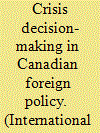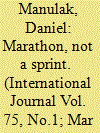| Srl | Item |
| 1 |
ID:
124419


|
|
|
|
|
| Publication |
2013.
|
| Summary/Abstract |
In 1985 the Canadian government closed its embassy in Lebanon and opened a mission in Syria. This realignment occurred amid charges from Lebanon and the Lebanese diaspora in Canada that the government was abandoning Lebanon at the moment of its greatest need and rewarding the malevolent Ba'ath regime in Damascus. The Canadian Department of External Affairs, under the leadership of Secretary of State Joe Clark, risked political fallout from this controversy-such as outrage from Lebanese and Israeli diaspora communities in Canada, injured relations with Israel, Lebanon, and Syria, and partial responsibility for the deteriorating human security situation in Lebanon-in favour of protecting the Canadian embassy staff from escalating violence in Beirut and seizing the opportunity to open a long overdue diplomatic presence in Damascus, Syria, from which the hard-line Ba'ath party dominated much of the region's politics.
|
|
|
|
|
|
|
|
|
|
|
|
|
|
|
|
| 2 |
ID:
174047


|
|
|
|
|
| Summary/Abstract |
In 2020, Canada does not maintain diplomatic ties with Iran or Saudi Arabia partly owing to their human rights violations—a choice which has eroded its capacity to act meaningfully in these countries. Thirty years ago, the Brian Mulroney government was faced with a similar decision: to sever relations with the white minority regime in South Africa or use its limited but real influence to contribute constructively to an end to apartheid. This article examines how Canada “punched above its weight” on an issue seemingly peripheral to its national interests from 1987 to 1990. It was during these oft-overlooked years—South Africa’s “darkest days”—that Canada engaged through multilateral fora, bilaterally, and its embassy to sustain global pressure and attention on apartheid. In so doing, the Mulroney government became a diplomatic battleground between its major allies, Pretoria, and its African Commonwealth partners. Such efforts were not without costs, but Canada’s “advanced middling” role helped to bring about a peaceful transition towards majority rule in South Africa and thus holds contemporary lessons for policymakers.
|
|
|
|
|
|
|
|
|
|
|
|
|
|
|
|
| 3 |
ID:
138291


|
|
|
|
|
| Summary/Abstract |
Three times in the span of 12 years (1968–1980), the foreign policy of the Canadian government was subjected to review by the Department of External Affairs. Although only the first of these efforts resulted in a white paper formally tabled as such in the House of Commons, subsequent reviews tended to follow the design of the first: a comprehensive examination of all aspects of the country’s foreign policy, led and coordinated by senior officials in External Affairs, drawing to varying degrees on expertise from other government departments and the private sector. In all cases, the reviews were intended to produce a document that would guide future policy. They served as useful tools not only for new governments seeking to differentiate their policies from those of their predecessors, but also for those in search of answers to challenges arising in the course of their mandates. This article analyzes the reviews undertaken between 1968 and 1980 and the circumstances that gave rise to them in an effort to account for the popularity of the white paper process among policymakers and to explore the process’s influence on policies subsequently pursued.
|
|
|
|
|
|
|
|
|
|
|
|
|
|
|
|